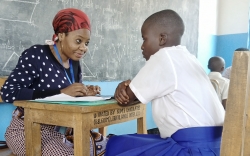
Adolescents make up approximately 16% of the world’s population, representing a significant demographic and socio-economic group. Approximately 90% of adolescents live in low- and middle-income countries (LMICs) and are significantly affected by injuries, undernutrition and obesity /overweight, HIV/AIDS, teenage pregnancy, and mental health illnesses. Early adolescence (10-19 years) is a particularly critical phase for research and intervention. Intervening through the education sector especially in schools where the majority of adolescents aged 10-19 can be found, provides an effective strategy for promoting healthy behaviors, and improving health.
We therefore proposed a formative assessment of the school health and food environment to better understand the policy surrounding school health environments, individual and population-level risk factors, and the current state of adolescent health, as are relevant to support the design, delivery and scale-up of high impact nutrition and health interventions through schools.
This study aimed to assess the school health and food environment in Mbeya region, Tanzania on three levels:
- Policy environment and existing interventions.
- The school food environment.
- The state of nutrition and health for in-school adolescents ages 10-19.
Three tools were designed to probe information for achieving these objectives; the students’ tool, vendors’ tool and teachers’ tool. A total of 36 schools were visited; 2161 students, 36 teachers and 164 vendors were interviewed.
We extent our gratitude to UNICEF Tanzania, the President’s Office – Regional Administration and Local Governments, the Ministry of Health, Community Development, Gender, Elderly and Children, Mbeya Regional Executive Officer, Regional Medical Officer and the Regional Health Management Team, the Regional Education Officer, all Council Executive Officers, Education Officers, Education Coordinators, and Head Teachers for their relentless support and co-ownership of this study. We are looking forward to delivering an informative report with recommendations on designing and implementing school health interventions under the IMAN Project and beyond.
